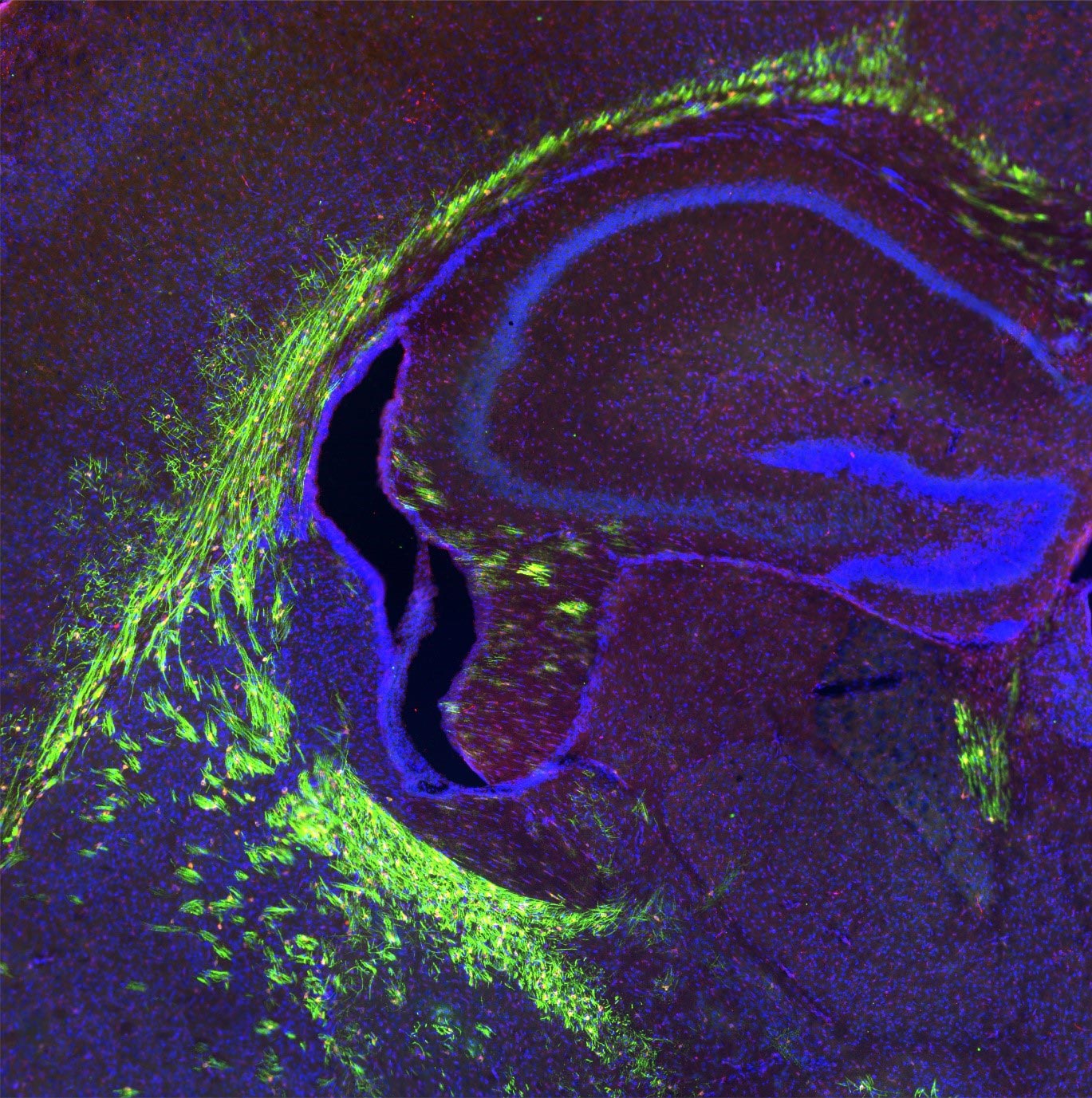
Cerebro del modelo preclínico en desarrollo con axones mielinizados (mostrado en verde). Científicos de Singapur han descubierto el papel fundamental de una proteína transportadora, Mfsd2a, en la regulación de las células cerebrales que mantienen las vainas de mielina, la membrana aislante que envuelve los nervios. Estos resultados publicados en Revista de investigación clínicaPuede ayudar a reducir los efectos del envejecimiento en el cerebro. Mfsd2a transporta lisofosfatidilcolina (LPC), un lípido que contiene ácidos grasos omega-3, al cerebro para la mielogénesis. Crédito: Dr. Vetrivel Sengotuvil
Los investigadores han descubierto que la proteína transportadora Mfsd2a es esencial para regular las células cerebrales que mantienen las vainas de mielina que protegen los nervios. Este descubrimiento podría ayudar a reducir los efectos del envejecimiento en el cerebro y dar lugar a tratamientos para los trastornos neurológicos causados por una mielogénesis reducida.
Científicos de Singapur han demostrado el papel crucial que desempeña una proteína transportadora especial en la regulación de las células cerebrales que aseguran que los nervios estén protegidos por cubiertas llamadas vainas de mielina. Los hallazgos, publicados por investigadores de la Facultad de Medicina Duke-NUS y la Universidad Nacional de Singapur en Revista de investigación clínicaPuede ayudar a reducir los efectos nocivos del envejecimiento en el cerebro.
Una membrana aislante que rodea los nervios, las vainas de mielina facilitan la conducción rápida y eficiente de señales eléctricas en todo el sistema nervioso del cuerpo. Cuando se daña la vaina de mielina, los nervios pueden perder su capacidad de funcionar y causar trastornos neurológicos. Con la edad, las vainas de mielina pueden comenzar a deteriorarse naturalmente, razón por la cual las personas mayores pierden sus capacidades físicas y mentales.
La pérdida de vainas de mielina se produce durante el proceso normal de envejecimiento y en enfermedades neurodegenerativas, como la esclerosis múltiple y[{” attribute=””>Alzheimer’s disease,” said Dr. Sengottuvel Vetrivel, Senior Research Fellow with Duke-NUS’ Cardiovascular & Metabolic Disorders (CVMD) Program and lead investigator of the study. “Developing therapies to improve myelination—the formation of the myelin sheath—in aging and disease is of great importance to ease any difficulties caused by declining myelination.”
To pave the way for developing such therapies, the researchers sought to understand the role of Mfsd2a, a protein that transports lysophosphatidylcholine (LPC)—a lipid that contains an omega-3 fatty acid—into the brain as part of the myelination process. From what is known, genetic defects in the Mfsd2a gene leads to significantly reduced myelination and a birth defect called microcephaly, which causes the baby’s head to be much smaller than it should be.

Dr. Sengottuvel Vetrivel (left) and Prof David Silver (right). Credit: Duke-NUS Medical School
In preclinical models, the team showed that removing Mfsd2a from precursor cells that mature into myelin-producing cells—known as oligodendrocytes—in the brain led to deficient myelination after birth. Further investigations, including single-cell RNA sequencing, demonstrated that Mfsd2a’s absence caused the pool of fatty acid molecules—particularly omega-3 fats—to be reduced in the precursor cells, preventing these cells from maturing into oligodendrocytes that produce myelin.
“Our study indicates that LPC omega-3 lipids act as factors within the brain to direct oligodendrocyte development, a process that is critical for brain myelination,” explained Professor David Silver, the senior author of the study and Deputy Director of the CVMD Program. “This opens up potential avenues to develop therapies and dietary supplements based on LPC omega-3 lipids that might help retain myelin in the aging brain—and possibly to treat patients with neurological disorders stemming from reduced myelination.”
Previously, Prof Silver and his lab discovered Mfsd2a and worked closely with other teams to determine the function of LPC lipids in the brain and other organs. The current research provides further insights into the importance of lipid transport for oligodendrocyte precursor cell development.
“We’re now aiming to conduct preclinical studies to determine if dietary LPC omega-3 can help to re-myelinate damaged axons in the brain,” added Prof Silver. “Our hope is that supplements containing these fats can help to maintain—or even improve—brain myelination and cognitive function during aging.”
“Prof Silver has been relentless in investigating the far-reaching role of Msdf2a ever since he discovered this important lipid transport protein, alluding to the many possible ways of treating not only the aging brain but also other organs in which the protein plays a role,” said Professor Patrick Casey, Senior-Vice Dean for Research. “It’s exciting to watch Prof Silver and his team shape our understanding of the roles that these specialized lipids play through their many discoveries.”
Reference: “Deficiency in the omega-3 lysolipid transporter Mfsd2a leads to aberrant oligodendrocyte lineage development and hypomyelination” by Vetrivel Sengottuvel, Monalisa Hota, Jeongah Oh, Dwight L. Galam, Bernice H. Wong, Markus R. Wenk, Sujoy Ghosh, Federico Torta and David L. Silver, 27 April 2023, The Journal of Clinical Investigation.
DOI: 10.1172/JCI164118

“Futuro ídolo adolescente. Explorador amigable. Alborotador. Especialista en música. Practicante ávido de las redes sociales. Solucionador de problemas”.





More Stories
Los casos de dengue alcanzan los 5,2 millones en las Américas mientras el brote supera el récord anual, dice la Organización Panamericana de la Salud
Los científicos de la UF esperan detener la mortal enfermedad bronceadora en las palmeras de Florida
Los científicos descubren el eslabón perdido entre la comida rápida y el cáncer